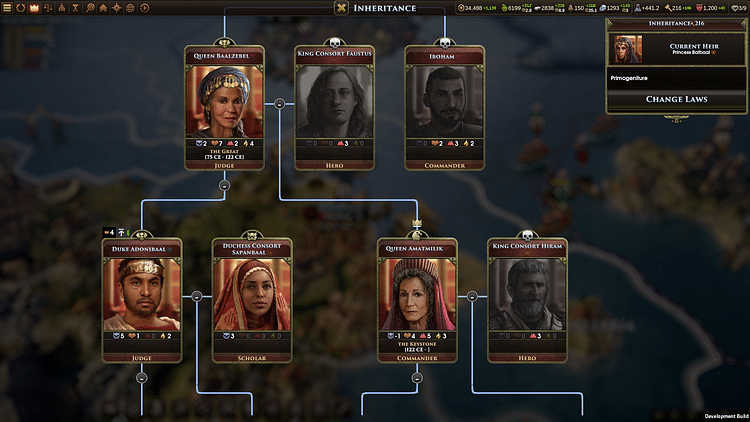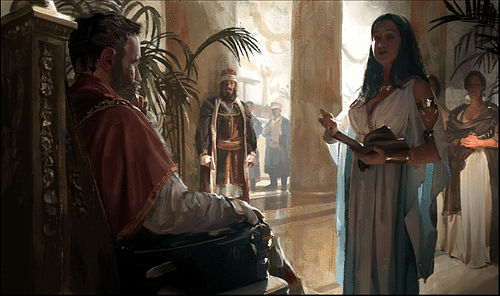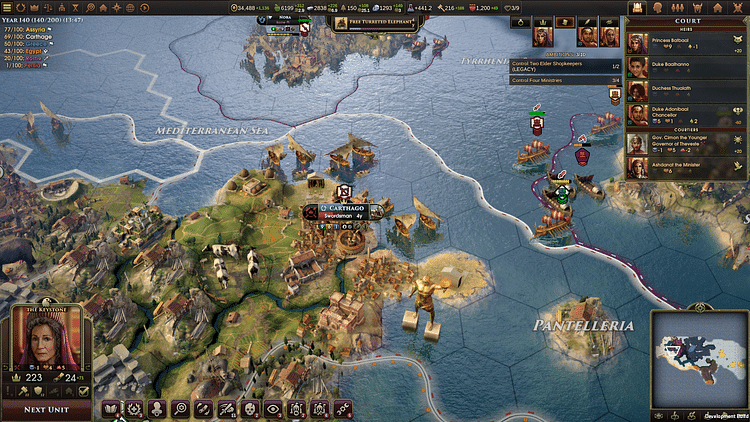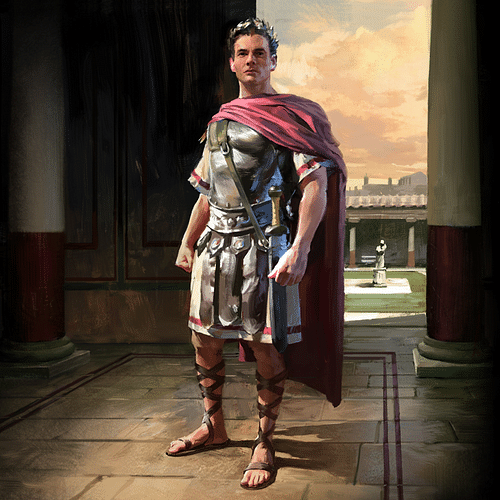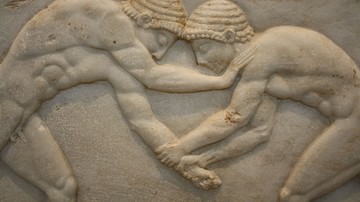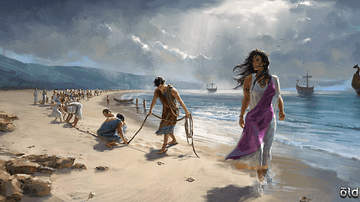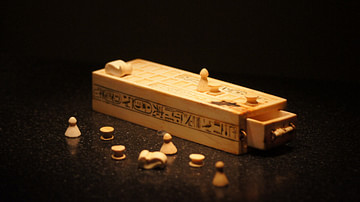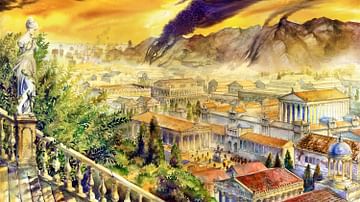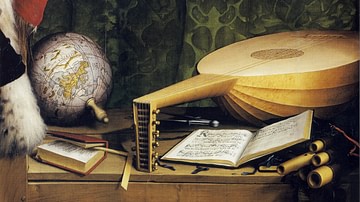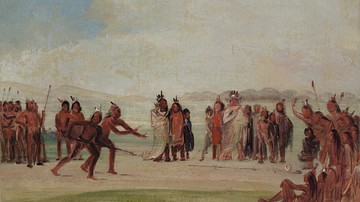In this article, we interview the creators of Old World, the new upcoming game by Mohawk Games. We are here with Leyla Johnson, the head writer of the game and CEO, and Soren Johnson, who is the creative director.
Jan (Ancient History Encyclopedia): Now, I have played Old World - great game, and I'm really enjoying it - so to start with, could introduce the game in your words and tell us what it is about.
Soren (Mohawk Games): Old World is a game about classical antiquity in the Mediterranean region. So you are going from Persia all the way out to Rome, Carthage to the west. As a shorthand version, it is a bit like Civilization, but you are actually playing a real person. For example, if you play Macedon, you start out as Alexander the Great's father, Philip II of Macedon; you will be in your 30s and Alexander will be about 12.
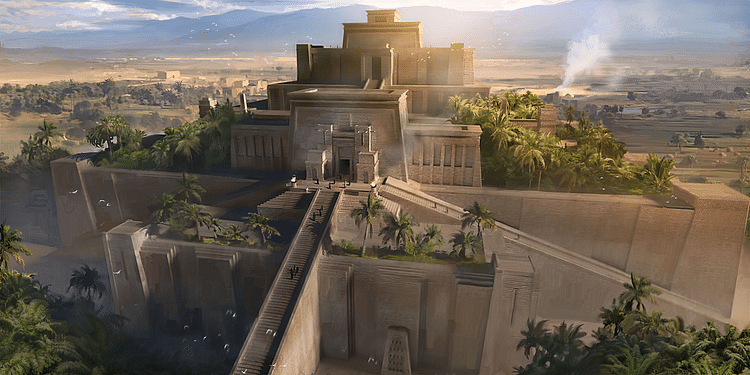
That is how the game begins. And every turn you get your older, and then eventually you will die or get assassinated. And then Alexander takes over... or not if something else happens to him. And then things work out in all sorts of different directions based on who marries who, what kids they have, and many other things about how the empire develops. In a way, it is taking 4X games and making it much more personal.
Jan: I mean, obviously, you already mentioned Civilization, but apart from Civilization, what kind of influences did you look at to make this game, and what inspired you to go down that route?
Soren: I think we see a lot of successful games recently that have focused on people. Civilization is a great game, obviously, but it can be a little abstract. You know, you are playing the same person for six thousand years and you never age and nothing really changes. That is really a marked contrast to a game like Crusader Kings, which is probably our most important influence.
But there are others. To some extent RPGs or games like King of Dragon Pass, but definitely, Crusader Kings is the game where you are not playing a nation, you are playing a specific person, which includes all the positives and negatives of being an actual person. So in our game, it really makes a difference if you happen to be a bold leader or a cowardly leader or you are insane or you have these different characters in love with you or you are in a feud with the leader of this other nation. The world is a lot more dynamic than a world where the characters never change.
Jan: For our readers who may not have played Crusader Kings or a game like that, you say you play a person, but obviously you do play a game for 200 turns. It is like 200 years. So you do not play one person.
Soren: Yeah. So Basically you are always going to be the leader, whoever that ends up being. In my example, you will be Philip until he dies. And then whoever is the heir, you will take over that person, and the game will continue. You are playing a dynasty. We are really leaning into that idea as nations and ruling families were very much fused back then. We want you to feel that way.
Jan: For our readers who obviously are interested in history, what kind of historical characters can you encounter in the game?
Leyla (Mohawk Games): The game starts with seven leaders of seven civilizations.
- We have Philip of Greece, the father of Alexander. We wanted to start with him because it actually did start with him. The way we know Greece today is because of Philip II and not necessarily because of Alexander the Great. Alexander carried the torch that Philip started on that path, and he just went and finished it.
- We have Cyrus II of Persia, Cyrus the Great. He is amazing, and under his rule, Persia was known to be tolerant, and it is reflected in the game. We were able to add that kind of mechanic.
- Then we have Dido, Queen Elissa, the Phoenician princess. The conversation is still ongoing whether we should start with Phoenicia because when Carthage was founded, it was an extension of Phoenicia.
- For Babylon, we have Nebuchadnezzar II, and he was known to be a lover of the arts and just a lover. The fact that he built the Hanging Gardens for his Persian princess, queen, lover, wife... it is very romantic, though its location is contested.
- We have Ashurbanipal from Assyria. His empire is portrayed to be violent, but actually, all civilizations back in the day were quite violent. He had the largest library of the day.
- There is Hatshepsut of Egypt. She is amazing, I keep just running into more information about her. They tried to bury her information for the longest time, and I think in the 1980s CE, archaeologists (and I send a lot of love to archaeologists) were able to finally solve the puzzle that she is not a male but actually a female pharaoh. Her knowledge of Egyptian religion is what helped her pull that off, and I would like to know how... How could she make that case? I want to know more. So, archaeologists, please!
- Who am I forgetting? Oh, Rome! This is quite challenging because we start with Romulus and the debate between myth and truth. So we do take liberties but we keep some things from Romulus and we start him off with a tense relationship with his brother.
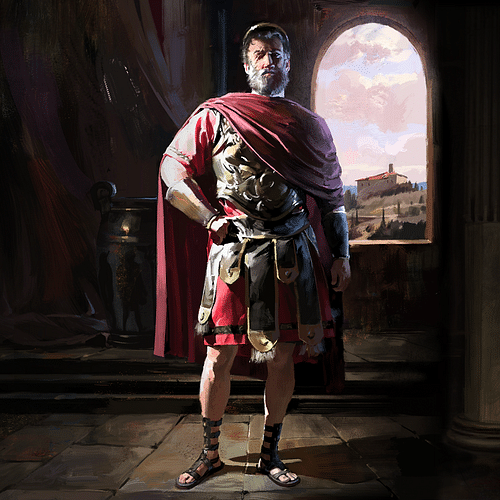
Jan: Do you think it is more about the feeling or the essence of the ancient world that you are trying to recreate rather than a specific time or a certain series of events?
Leyla: The Old World was very colorful, I think, we are just trying to take that color and information and put it out there and marry it to amazing mechanics and design and see what we can do with it. There is a lot of history in Old World. I will let Soren handle that part of the question.
Soren: It is tough if you really try to make it accurate. The natural comparison would be the Paradox games, right? They are not necessarily accurate, but they are trying to make it look like the real world. The default way of playing is not on a random map; you are trying to have a kind of alternate history that is still on Earth.
We are more like a fantasy version of history, but it is very rich. So that means we are still going to pull in a lot of real little bits; the more story pieces we bring in the more the feel of history comes through. We give ourselves a lot of freedom, but at the same time, we want to take advantage of the setting.
A lot of our events come from all these little stories that we pick up from our research. We have read this interesting story of what Olympias did for Alexander, but that does not really mean we do that for Olympias and Alexander. Instead, we create some events for any situation that is somewhat similar, where you have a wife who is a schemer, who has a son that she wants to put on the throne, and the game can throw that event at you at any time... it just happens to be inspired by this real thing.
Leyla: I have to say something about Olympias because I am trying not to portray Olympias as necessarily a schemer back in the day. If a man did it, it would not be scheming - he would be a great strategist... Olympias was a great strategist! We saw how history portrayed Olympias. We took that and then I created a few events that have to do with a strategic mother, trying to push the agenda of her son, which I think back in the day was very smart.
Alexander was showing to be extremely brilliant from an early age, and he had an amazing education. She was a strategist, she was phenomenal! We were able to create a series of events just inspired by Olympias; some of them match a schemer trait, and some of them match a strategist, and a love of a mother, basically just trying to make sure that her son is the heir to the throne.
Jan: I can clearly hear how there is a lot of love for history that went into the game to bring it to life. Now, for somebody who has not played your game and maybe has not played an event-based game like Crusader Kings or King of Dragon Pass or Total War to some extent, can you explain a little bit about how events work in the game and how they influence the game?
Soren: Sure. So we have a very powerful event system that we have been working on for the last few years, we are closing in on about 2,000 events in the game, and we are going to keep adding to that as we continue development. For each event, we have an idea of a story we want to tell or a decision that a ruler might need to make. For example, if you have an old king who does not have any heirs, the noble families in your realm come forward and they each suggest someone for the leader to adopt.
Leyla: We usually have the voice of the vizier who is approaching you, your counsellor, or someone who is coming in to give you news and get your take on it. And then you have options like your wife is being seen with the head architect and this is starting gossip. It could be just really something personal like this.
Or the Assyrians send their ambassador to Babylonia, and they seem to be doing an alliance. How would you react to it? I try to put myself in the shoes of the ruler... We can build on strategy or propaganda or we can interfere in that alliance because it hurts us. Or you know what? I do not care.
And we can be as petty as Henry VIII of England, sometimes giving an option of "I am the best of the best and no one can criticize me, cut his head off."
Jan: One thing that I found is that compared to the more recent Civilization games, your game is a lot more militaristic. There is a lot more fighting going on probably to reflect the realities of the ancient world. Can you talk a little bit about how combat works in the game and your empire building and expansion and wars?
Soren: We felt like we wanted a game where there would be a good tension between your military side and your economic side. I know in Civilization it is talked about a lot, but in practice, it is not given as much attention as we would like. In the Civilization games, if you have workers, there is really no reason not to have your workers doing something all the time.
What we did is probably the most significant gameplay change compared to not just Civilization, but probably all other 4X games. It is called the order system, which is that every time you move a unit and take other actions in the game like appoint a governor or send your ambassador to make peace with someone else, or assassinate a character, they all cost orders. Orders represent your administrative power, basically.
That means you can move a unit multiple times in a turn if you want. You can spend all of your orders to move one unit if you want to or you can sprinkle orders out. What you will see is once people get into wars, they will start using all of their orders moving their military units around. There will always be more to do than they will be able to.
This is also to combat the problem of 4X games. Since you move every unit every return, the more units you get, the more stuff there is to do, and the longer the turns take. And at some point, it is just more stuff than you want. If you have a war, you are spending all your orders on combat, and then suddenly you realize your workers have not been doing anything for a while and are just standing in the field not active because you are sacrificing that side of the game.
So there is a real trade-off. We really feel like without that tension the game becomes a lot less interesting, so there is not any sort of pure military or pure economic path. This is a game about making these trade-offs.
Jan: One thing I found that through this order system, which obviously also applies to the AI player, to your enemy, the game becomes far less predictable than, say, a game of Civilization where you know that the catapult over there cannot reach you. What I have noticed in Old World is you see the front line and you feel "I'm going to win this one" and then you end the turn and suddenly the AI brings in this enormous army from far away that can completely overwhelm you. Very much like the real world where (especially at that time) in war you would not know what armies are around.
Soren: We also made a pretty small but pretty important change in that we like the idea that attacking should always be fun. So you only take a tiny one hit point of damage, basic attrition, but you cannot really lose combat when you are attacking. You can lose in the counterattack when they hit you back. It really encourages people to try things out and be aggressive.
Games are more fun when you are attacking. There are a lot of 4X games where people figure out various defensive strategies, and the AI keeps attacking and losing their troops doing it. I do not actually have to think, I can just sit here let the AI kill itself. We wanted to get rid of that.
Jan: One of the things I also wanted to talk about is how you brought that world alive. Leyla, I think you said something in the very beginning, that the ancient world was very colorful. And that is something that struck me; the game is very vibrant in its color and its representation of the ancient world.
Leyla: Well, first of all, the amount of research that goes into every single thing we do is endless. First of all, we have amazing artists, from the in-house artists to the contracting art that we do.
If you take a look at the portrait art, I read every bio! First I read about the character and the type of clothing, the architecture, what they were known for, what their personality could have been like. What is the pose when you start as Philip II? And when you are born by a she-wolf and your father is Mars, what do you look like?
So we try to recreate that type of personality and we try to create skin tone, features, colors, and what we know. Did they have facial hair? Did they have injuries? Were they part of the military? For example, Philip could be dressed as military. What about Hatshepsut who declared herself to be male? We wanted her not to be extremely feminine. She wanted to be known as a male pharaoh, and you can see that in her pose. Dido was known to be defiant. She killed herself just so she would not have to be played as a pawn. So you see her standing with her hands on her hips. We try to take that pose as a statement of who they were.
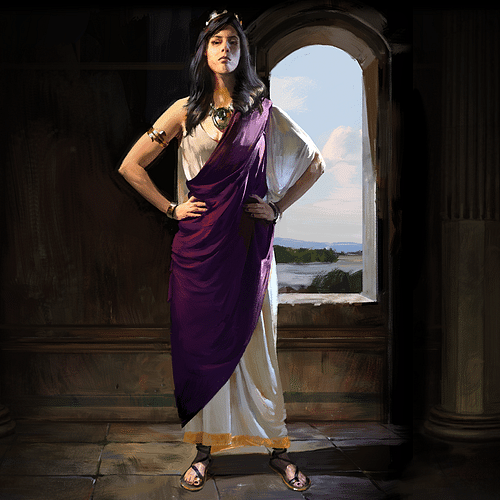
And I work on the Wonder art with an artist in Azerbaijan; he's phenomenal. So I create the references for him, and he creates the Wonder arts. We try to recreate the Ziggurat or the Ishtar Gate how it would have looked back then.
For the Hanging Gardens of Babylon, we wanted the hanging-feel of the gardens. Why were they called that? And we found out that according to the sources Nebuchadnezzar built them to remind his wife of her home, Persia. We wanted it to be hilly-like, but still a structure. So you can see the greens hanging, cascading, and we wanted some water to be closeby. Every single painting is a story.
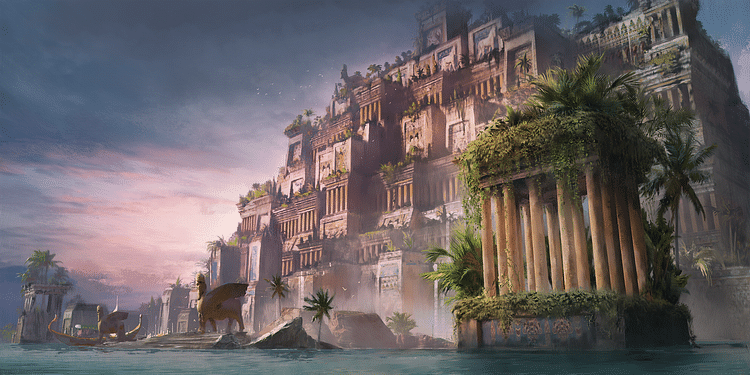
Jan: Correct me if I am wrong, but I had the feeling that you are really trying to aim for more of a feel and than for historical accuracy, not only because obviously we do not really know exactly how these people looked or nobody has any clue what the Hanging Gardens actually looked like. So your depiction of the Hanging Gardens or the Colossus of Rhodes are quite fanciful, whereas the depiction of the Ishtar Gate, where we actually do know what it looked like, is pretty accurate.
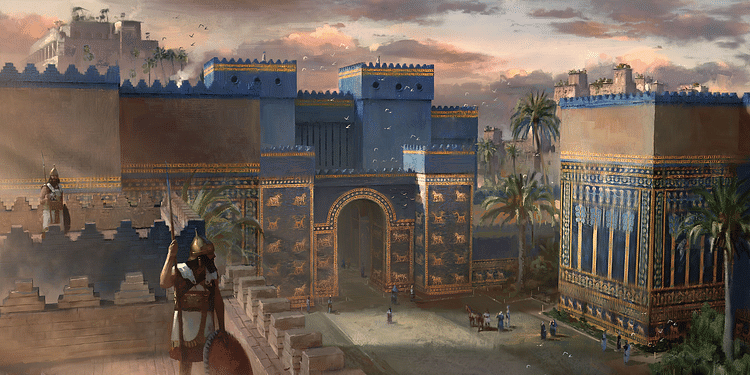
Leyla: The word wonder implies wonder. So we are trying to create a structure that is believable, but also super majestic. We try to exaggerate romantically what something would have looked like so that it looks like a wonder.
Jan: The game right now is in early access, right? You have mentioned it before, but for people who are not necessarily familiar with that term, what does that mean?
Soren: It basically means that the game is playable enough, that we are comfortable releasing it in a version that people could pay money for, but that it is not finished. We are essentially inviting the community to help us develop the game.
Jan: Thank you very much for having introduced the game. I hope that everybody who reads this might be getting interested. The game is available on the Epic Game Store, and it is early access, so that means it is not quite finished yet, but definitely playable and a lot of fun!
